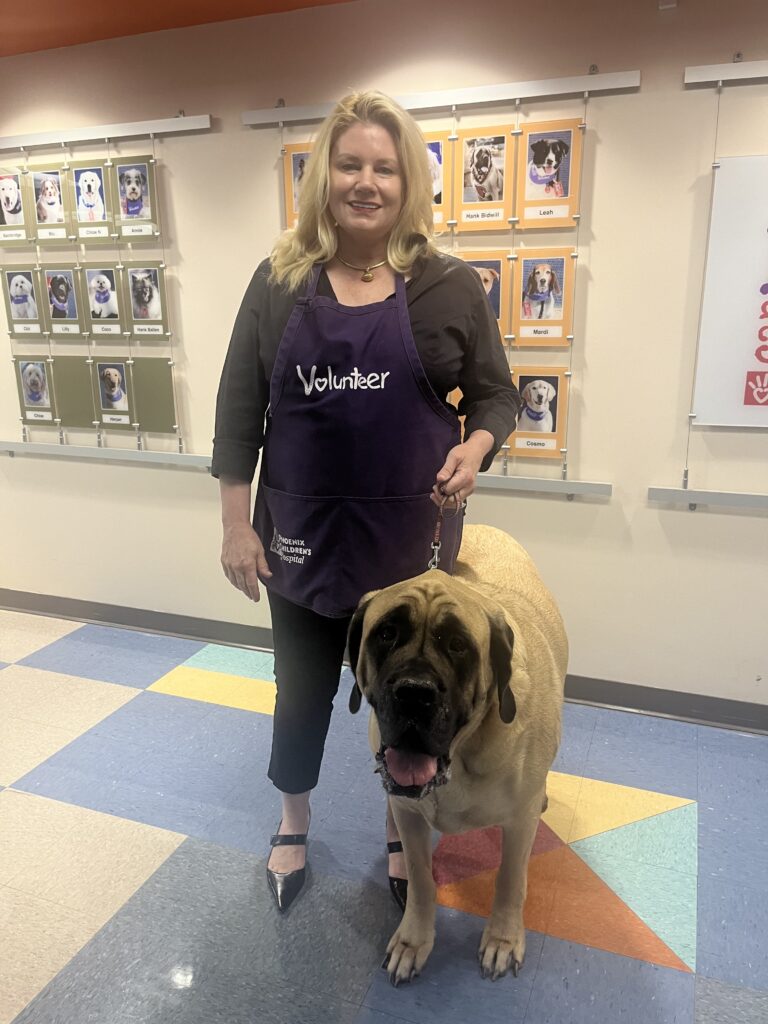How Paws Can Heal: My Journey with Animal-Assisted Therapy at Phoenix Children’s Hospital

For over a decade, I’ve had the privilege of witnessing firsthand the remarkable impact that a simple wag of a tail can have on a child’s healing journey. Volunteering at Phoenix Children’s Hospital with my therapy dogs has been one of the most rewarding experiences of my life.
It all began with a special request from a Cardinals fan. Their child was in the hospital, and they asked if I could bring Barney, my beloved St. Bernard, for a visit. Barney was registered with the Alliance of Therapy Dogs, and I thought, why not bring a little comfort to a child in need? That visit turned out to be life-changing—not just for the child and their family, but for me as well. Seeing the joy and comfort that Barney brought to that hospital room was something I’ll never forget. It was in that moment that I knew I had found a new way to give back to the community and make a difference in the lives of these incredible kids.
Since that day, I’ve been a proud participant in PCH’s Animal-Assisted Therapy Program, which is supported by donations and organizations like PetSmart Charities. Currently, the program has 34 therapy dogs and two therapy cats, all of whom are registered with professional organizations like Pet Partners. The program’s mission is simple: to bring comfort, joy, and healing to children through the unconditional love of animals.
The process of animal-assisted therapy is carefully coordinated. When hospital staff recognize a patient who might benefit from a visit with a therapy animal, they submit a request just like they would for any medical procedure. Then, the program coordinator pairs the patient with the best-suited therapy animal. Along with my dedicated escort, Emily, Hank and I make our way to the patient’s room with specific goals for the visit.
One of the most striking findings from PCH’s own research is the impact these visits have on a patient’s stress levels. Studies have shown that after interacting with a therapy dog, patients experience a significant reduction in cortisol, the stress hormone. This decrease not only helps improve their mood but also enhances blood circulation, digestion, and respiratory function—all critical elements in the recovery process. But the benefits don’t stop there. Therapy dogs like Hank also encourage patients to get up and move, which is essential for physical rehabilitation, and they help foster stronger doctor-patient relationships by creating a more relaxed and positive environment.
The need for therapy animals at PCH is immense. While 36 therapy animals might seem like a lot, the demand is so great that we’re always looking for more teams to join us. The smiles, laughter, and even tears of relief and joy that these animals bring to the children, their families, and the hospital staff are truly priceless.
Hank, my English Mastiff, has been with me on this journey for several years now. He’s registered through Pet Partners, and together, we’ve formed a bond with the children at PCH that goes beyond words. Hank has a unique ability to sense when a child is anxious or in pain, and his gentle presence often helps them open up, relax, and even find the courage to face their treatments.
Volunteering at PCH isn’t just about bringing a dog to visit; it’s about being part of a team that believes in the healing power of love and connection. The Animal-Assisted Therapy Program is funded entirely by donations, which cover everything from the cost of the full-time facility dogs to their care, feeding, and grooming. It’s heartwarming to know that the community supports this program so generously, ensuring that these therapy animals can continue to bring joy to those who need it most.
As Hank and I prepare for our next visit, I’m filled with gratitude for the opportunity to be part of something so special. Every child we meet reminds me of the incredible resilience and courage that defines the patients at Phoenix Children’s Hospital. I’m honored to play a small role in their healing journey, one wag at a time.